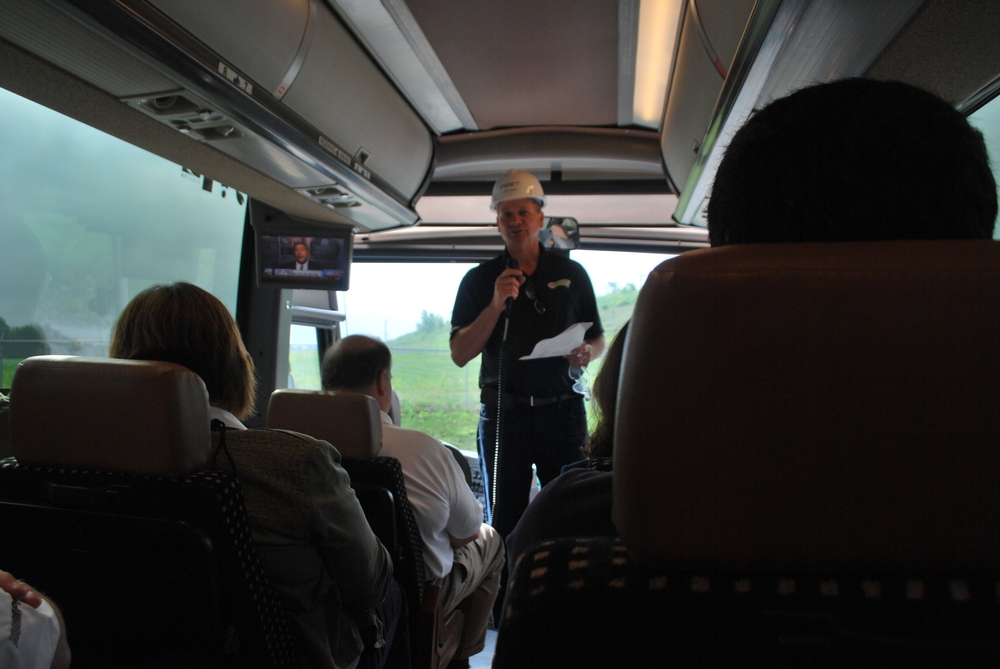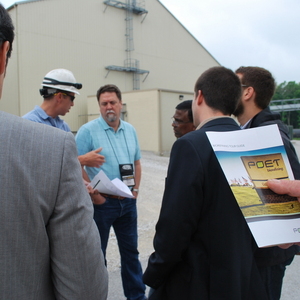Poet Biorefining-Cloverdale welcomed FEW attendees



Sue Retka Schill
June 12, 2014
BY Katie Fletcher
It all began from a single, humble refinery in Scotland, South Dakota, and now Poet LLC has grown to one of the world’s largest producers of ethanol. Poet Biorefining-Cloverdale is one of the company’s 27 facilities contributing to the expansion. An industry tour of this facility rounded off the 2014 International Fuel Ethanol Workshop & Expo in Indianapolis. Fifty-five interested FEW attendees took advantage of getting a look at the 92 MMgy facility, with tickets sold out days before the conference.
The facility was purchased by Poet in June 2010, formly operated by Altra Biofuels. The facility underwent an extensive $30 million facility upgrade including installing Poet’s BPX fermentation process, a water recovery system and new pollution control equipment, improving the orginal plant design. The BPX fermentation process uses enzymes instead of heat, reducing energy usage by 10 to 15 percent. The plant was brought back online March 22, 2011, now providing a high performace, environmentally friendly fuel, as well as 246,500 tons of Dakota Gold brand livestock feed per year for regional, national and international markets. The carbon dioxide produced from the fermentation process at some of Poet’s plants is collected, compressed and marketed for use in other industries, but the CO2 at this plant is ultimately reabsorbed by future corn crops.
Advertisement
Advertisement
The facility has the world’s largest grain dryers, consumes 31 million bushels of corn per year and uses about 28,000 BTU per gallon. The plant has enhanced the local Cloverdale economy with improved corn prices, value-added markets for farmers, good-paying jobs with 46 employees at the plant and 200 local jobs and increased local tax revenue. The operation stays busy 24 hours a day and takes time out of that around-the-clock schedule to share how they produce ethanol with people from all around the world.
Advertisement
Advertisement
Related Stories
Iowa farmers have a new market opportunity for their 2025 soybean crop. Landus is expanding its Clean Fuel Regulation initiative, made possible by recent policy changes expected to increase Canada's demand for liquid biofuel.
Topsoe, a leading global provider of advanced technology and solutions for the energy transition, has been selected as the renewable diesel technology partner for CountryMark’s Mount Vernon, Indiana refinery.
The U.S. exported 35,953.6 metric tons biodiesel and biodiesel blends of B30 or greater, according to data released by the USDA Foreign Agricultural Service on Aug. 5. Biodiesel imports were at 2,148.9 metric tons for the month.
XCF Global leverages Alfa Laval technology to enhance pretreatment capabilities at New Rise Reno facility
XCF Global Inc. on Aug. 5announced it leverages Alfa Laval Inc. pretreatment technology at its New Rise Reno biorefinery, a sustainable aviation fuel (SAF) plant located in Nevada. The pretreatment technology enhances feedstock flexibility at the plant.
U.S. Secretary of Agriculture Brooke L. Rollins on Aug. 1 announced the opening of a 30-day public comment period for stakeholders to provide feedback on the department’s reorganization plan, as outlined in the memorandum released July 24.
Upcoming Events










